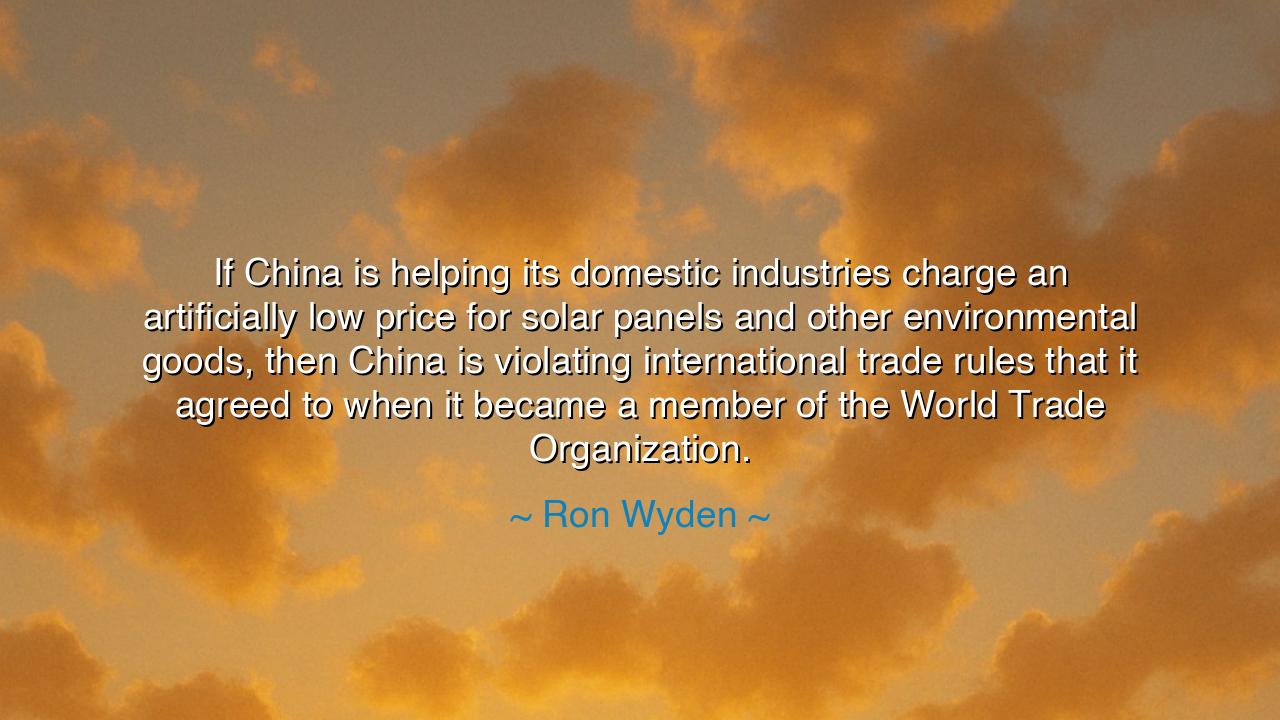
If China is helping its domestic industries charge an
If China is helping its domestic industries charge an artificially low price for solar panels and other environmental goods, then China is violating international trade rules that it agreed to when it became a member of the World Trade Organization.






Ron Wyden, with the voice of a watchful guardian over the balance of nations, declared: “If China is helping its domestic industries charge an artificially low price for solar panels and other environmental goods, then China is violating international trade rules that it agreed to when it became a member of the World Trade Organization.” These words are more than the speech of a legislator; they are the cry of one who sees the delicate fabric of fairness stretched to the breaking point. They remind us that commerce, like justice, depends upon trust, and that when promises are broken, the harmony of the world begins to unravel.
The meaning of this saying is layered. On the surface, it is about trade rules—the agreements nations make when they enter the community of commerce. Beneath the surface, it is about fairness itself. To sell goods at artificially low prices through state support is to tilt the field, to strike not with open hand but with hidden weight. It is to betray the covenant made with other nations, to place profit above honor. Wyden’s warning is that such actions, though clothed in economic terms, are in truth violations of trust, and trust is the lifeblood of both law and trade.
The origin of his statement lies in the early 21st century, when disputes arose over the global market for solar panels and clean technologies. The world, striving for a future of sustainability, turned to these environmental goods as weapons against climate change. Yet in this noble arena, competition was not pure. Allegations rose that China, through subsidies and state intervention, allowed its industries to sell below cost, driving others from the field. In such a climate, Wyden spoke, reminding the world that the World Trade Organization was built not merely to regulate but to protect fairness, and that promises made must be honored if peace and prosperity are to endure.
History offers parallels. Consider the Navigation Acts of England in the 17th century, when laws were bent to favor English ships at the expense of rivals. Though cloaked as policy, these measures sparked resentment, conflict, and war. Just as England’s policies once strained the bonds of international commerce, so too do unfair practices in modern times sow discord. The lesson is the same: when trade becomes unbalanced by manipulation, the sword often follows the scale. Wyden’s words are thus not just economic warning, but political prophecy.
There is also a deeply emotional current in his words, for at stake is not only profit but the future of the earth. The goods in question—solar panels, wind turbines, the tools of clean energy—are not trinkets of vanity but instruments of survival. To corrupt their trade with dishonor is to slow humanity’s path toward healing the planet. Thus Wyden’s warning becomes both economic and moral: that even in the pursuit of green technologies, integrity must guide action, lest the hope of the many be stolen by the advantage of the few.
To future generations, this saying offers both warning and hope. The warning: that even noble industries can be corrupted by greed, and that even agreements made in solemn halls can be broken in the shadows of commerce. The hope: that by upholding rules, by defending fairness, by demanding transparency, nations can ensure that innovation serves not only one people but all. Just as the World Trade Organization was built upon covenant, so must future trade be built upon mutual trust.
The lesson for us is this: whether in nations or in daily life, do not seek advantage through deception, for what is gained in dishonor is lost in respect. In practice, this means supporting policies that encourage fair competition, demanding accountability from leaders, and remembering always that the pursuit of sustainability must walk hand in hand with the pursuit of justice. If we betray one, we endanger both.
Thus Wyden’s words endure as counsel: “If China is helping its domestic industries charge an artificially low price… then China is violating international trade rules…” Let these words be remembered not as condemnation of one nation alone, but as a teaching for all: that the strength of commerce lies in trust, and the strength of trust lies in honor. Guard this honor well, for upon it rests the prosperity of nations and the survival of the earth itself.






AAdministratorAdministrator
Welcome, honored guests. Please leave a comment, we will respond soon